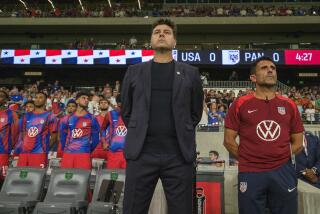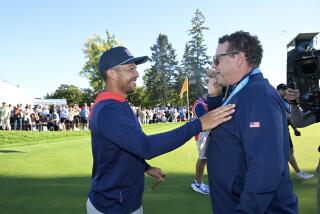Upstart Americans go down
- Share via
A decade ago, in the summer of 1999, a group of American women led by the likes of Mia Hamm and Michelle Akers, Julie Foudy and Joy Fawcett, carried the U.S. to one of its admittedly few but certainly most memorable soccer triumphs.
By winning the Women’s World Cup and, in the process, selling out stadiums all across America, the team captured the imagination not only of the soccer community but of the entire country.
On Sunday, a group of American men moved one little step closer to catching up.
Just five days after stunning Spain, the world’s top-ranked team, in the semifinals of the FIFA Confederations Cup in South Africa, the U.S. men came within a whisker of upsetting five-time world champion Brazil in the final in Johannesburg.
If they could have hung on for only 20 minutes longer, they would have won their first international title.
In the end, the defending champion Brazilians prevailed, turning a 2-0 halftime deficit into a 3-2 victory in front of 52,291 at Ellis Park stadium, one of the venues for next summer’s World Cup. Earlier, in the third-place match, Spain overcame South Africa, 3-2, in extra time.
It was a bitter loss for the Americans, but the lessons it will leave behind could be invaluable.
“We continue to try to move ourselves forward,” U.S. Coach Bob Bradley said. “Playing these kinds of games only helps, but it still feels pretty lousy to let this one get away.”
It got away, but the fact that the U.S. had its hooks into Brazil and was about to land it will only encourage the players once they get over their disappointment.
For 45 minutes Sunday, they went toe to toe with the best Brazil had to offer. When the teams went into the locker room at halftime, the Americans were leading, 2-0.
Just as they had in the 2-0 upset of Spain on Wednesday, the U.S. players showed the intensity needed at this level. They played without fear, and it was Brazil that was forced onto the back foot.
The U.S. took the lead in the 10th minute when defender Jonathan Spector swung a cross in from the right and Clint Dempsey swung a hopeful leg at the ball. It came off his right shin and slipped in at the far post, out of the reach of Brazil goalkeeper Julio Cesar.
It was Dempsey’s third goal of the tournament.
In the 27th minute, Ricardo Clark sent a pass down the middle to Landon Donovan, who in turn sent the ball wide left to Charlie Davies. Davies cut a square pass back to Donovan, who sidestepped midfielder Ramires and then fired an angled shot that beat Cesar as the goalkeeper moved the wrong way.
It was the Galaxy player’s 41st goal for the national team.
Leading by two goals against the defending champions was an unthinkable position, but not a secure one. Brazil regrouped and came back with a vengeance. Forty-five seconds into the second half, it cut the deficit in half.
Forward Luis Fabiano, marked by defender Jay DeMerit, collected a pass, turned and fired a shot all in one decisive movement, beating DeMerit and goalkeeper Tim Howard.
Pressing for the tying goal, Brazil got it in the 74th minute, and again it was Fabiano who did the damage. Kaka made a run into the U.S. penalty area before cutting the ball back to Robinho, who fired a shot off the crossbar.
The ball bounced downward and then back into the air, and Fabiano was on hand to power a header into the back of the net from close range. It was the forward’s tournament-high fifth goal and earned him the golden boot award.
Ten minutes later, with the U.S. desperately trying to hang on and force extra time, Brazil grabbed the winner.
A corner kick on the right was floated across to the far post, where Lucio, Brazil’s captain, outjumped Dempsey to hammer a header into the net, setting of a delirious Brazilian celebration.
Dempsey was in tears at the end. Other U.S. players looked stunned. But in the win over Spain and in the first half Sunday, the Americans showed they are now better able to compete on more even terms with the world’s best.
Sunil Gulati, the president of U.S. Soccer and the man trying to bring the World Cup back to the U.S. in 2018 or 2022, made the point after the Spain game.
“We haven’t convinced the world we’re better than Spain,” he said. “What we convinced the world was we can beat Spain.
“Nobody is ready to crown us world champions. . . . But our players know what they’re capable of. . . . The reality is, we’ve got a pretty good team.”
The gap, though, is still there, and it might take another decade or two to close it. The Brazilians, who had beaten the U.S., 3-0, in the first round, are the benchmark.
“You look around at their players and you realize why they’re worth so much and why they play at the teams they play,” Donovan said.
Howard, who was named goalkeeper of the tournament, put it another way.
“It’s amazing how off-balance they put you,” he said. “You have no idea what they’re going to do until they do it, then you react. That’s why they are who they are. All of their players are world-class.”
After finishing third in the Confederations Cup tournaments in 1992 and 1999, a second-place finish by the U.S. in 2009 should cause fans to stop calling for Bradley’s head and at the same time look forward to South Africa 2010.
“I think people around the world see that we have a good team, we have good players, and hopefully we can continue to step forward,” Bradley said.
Donovan wants even more.
“We’re at the point where we don’t want respect,” he said. “We want to win.”
Just like Mia Hamm and friends did a decade ago.
--
Jones reported from Los Angeles.








